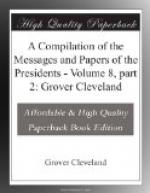At your late session a joint resolution was adopted authorizing the President to take measures for facilitating a proper representation of the industrial interests of the United States at the exhibition of the industry of all nations to be holden at London in the year 1862. I regret to say I have been unable to give personal attention to this subject—a subject at once so interesting in itself and so extensively and intimately connected with the material prosperity of the world. Through the Secretaries of State and of the Interior a plan or system has been devised and partly matured, and which will be laid before you.
Under and by virtue of the act of Congress entitled “An act to confiscate property used for insurrectionary purposes,” approved August 6, 1861, the legal claims of certain persons to the labor and service of certain other persons have become forfeited, and numbers of the latter thus liberated are already dependent on the United States and must be provided for in some way. Besides this, it is not impossible that some of the States will pass similar enactments for their own benefit respectively, and by operation of which persons of the same class will be thrown upon them for disposal. In such case I recommend that Congress provide for accepting such persons from such States, according to some mode of valuation, in lieu, pro tanto, of direct taxes, or upon some other plan to be agreed on with such States respectively; that such persons, on such acceptance by the General Government, be at once deemed free, and that in any event steps be taken for colonizing both classes (or the one first mentioned if the other shall not be brought into existence) at some place or places in a climate congenial to them. It might be well to consider, too, whether the free colored people already in the United States could not, so far as individuals may desire, be included in such colonization.
To carry out the plan of colonization may involve the acquiring of territory, and also the appropriation of money beyond that to be expended in the territorial acquisition. Having practiced the acquisition of territory for nearly sixty years, the question of constitutional power to do so is no longer an open one with us. The power was questioned at first by Mr. Jefferson, who, however, in the purchase of Louisiana, yielded his scruples on the plea of great expediency. If it be said that the only legitimate object of acquiring territory is to furnish homes for white men, this measure effects that object, for the emigration of colored men leaves additional room for white men remaining or coming here. Mr. Jefferson, however, placed the importance of procuring Louisiana more on political and commercial grounds than on providing room for population.
On this whole proposition, including the appropriation of money with the acquisition of territory, does not the expediency amount to absolute necessity—that without which the Government itself can not be perpetuated?




